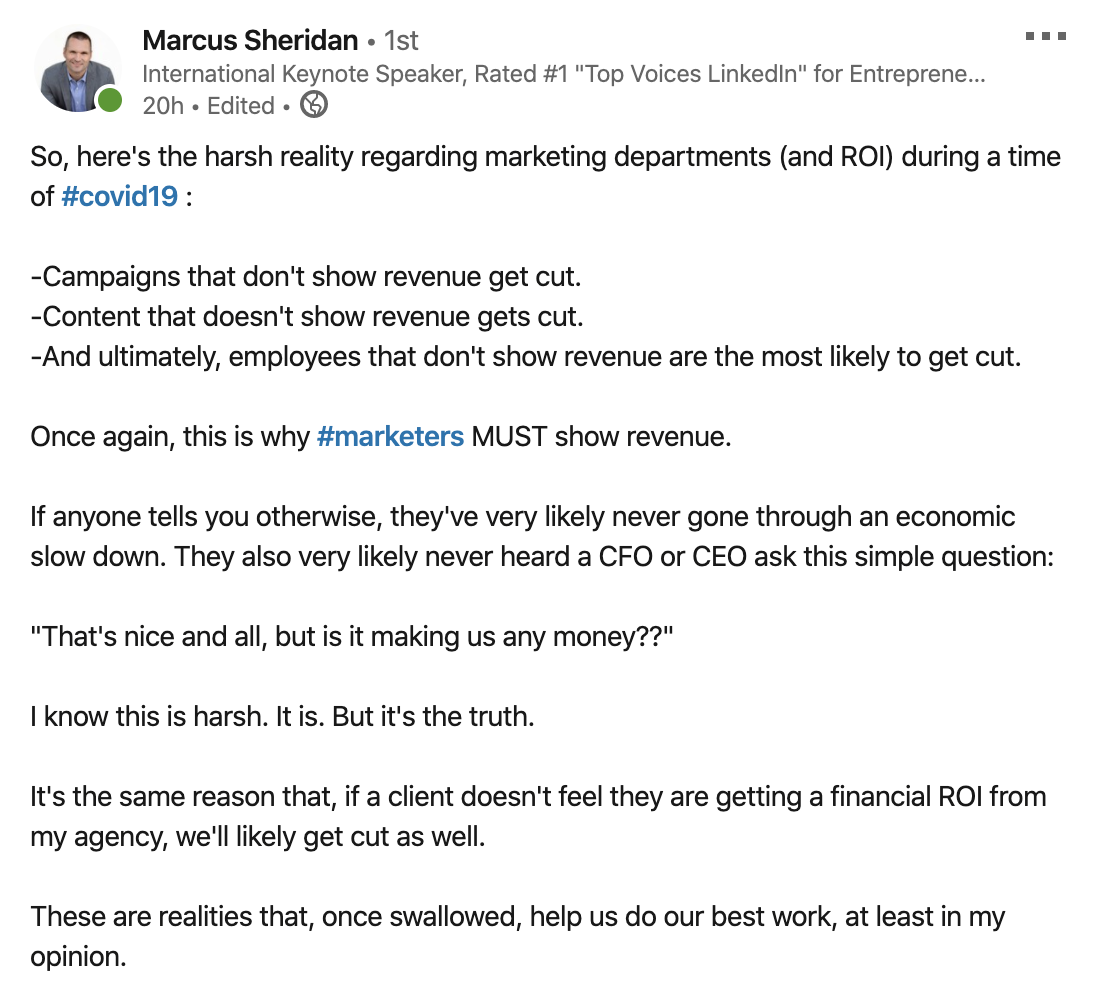Subscribe now and get the latest podcast releases delivered straight to your inbox.
How to have a great relationship with your marketing consultant (tips and examples)
.png?width=50&height=50&name=Brian%20(1).png)
By Brian Casey
Apr 27, 2020

There are a lot of articles, and even best-selling books, that teach digital marketing agencies and consultants how to build great and effective relationships with their clients.
Yet I haven't seen anything written that clearly defines what a good two-way client-consultant relationship looks like. Most of what's out there touts the benefits of “great communication” and “trust,” as if those are the earth-shattering ideas that will form a great partnership.
But those buzzwords (while still very important) aren’t going to help you get the most out of working with a consultant.
In fact, I’d bet most people think they know what it takes to create a good working relationship — maybe even some of you reading this.
I’d also bet that most of you have had at least one strained business relationship — agency or otherwise — or one that failed outright. You were frustrated about that task someone didn’t do, felt like you were speaking to a wall, or you got no help in reaching your goals.
Here's the thing about genuinely healthy client-consultant relationships:
They won’t fall into your lap, and your good intentions around "great communication" and "trust" will only get you so far — you have to put in the work, and you have to have a clear picture of what that looks like.
First, here's why I care so much about good client-consultant relationships
As a content marketing consultant at IMPACT, I work with clients to bring a sales-focused approach to their written content (blogs, website pages, etc.), so as to drive revenue growth and content marketing ROI that can be measured.
That being said, I wouldn’t consider myself a “people person.” In fact, I feel like I’ve been training my entire life to thrive in the social distancing era.
I do, however, love working with clients and helping them reach their goals.
That's why I felt so strongly about writing this article to begin with. I'm not a feelings-forward kind of guy, but I do feel exceptionally passionate about defining and setting the conditions for a successful client-consultant relationship.
My goal today is to establish the core set of principles that will help you have healthier relationships with your marketing agency consultants, while also helping you side-step the most common challenges you've likely encountered in the past.
Moreover, beyond just presenting you with information and leaving you to fend for yourself, you’ll also see examples that will help you put these principles into action.
So, what does a good client-consultant relationship look like?
A healthy, productive, successful client-consultant relationship:
- Has defined expectations and roles
- Includes permission to be critical
- Has established a shared set of measurable goals
- Empowers participants to take turns coaching each other
Defined expectations and roles
This probably seems like such a no-brainer thing to weave into any partnership. Where things go wrong, however, is not that people reject the idea of establishing expectations and roles within this type of relationship.
Rather, people don't do it correctly. That’s why we need to discuss how to properly set expectations and define roles.
There has to be a clear understanding by both parties of who will do what, when it will happen, and how you’ll collaborate. It’s important to note that this is not an exercise where you speak in broad terms about expectations and roles.
Go through everything you'll be collaborating on and address the who, what, where, and how of how things will be done.
Here’s an example of how those expectations and roles apply to the IMPACT content consulting relationship, as it pertains to our content review process:
- Who: Clients are the content creators and initial editors. Consultants review client created content.
- What: Clients will produce anywhere from one to three "The Big 5" content pieces per week for review.
- Where: Content will be written in Google docs by the client. Once a new piece of content is ready for review, the client will add the article link to Basecamp and notify the consultant that it’s ready for review. Reviews are made in suggestion mode in the same Google doc.
- How: Clients will send content for review 48 hours or more before the expected publish date of the article or webpage. Consultants will typically review content within 48 hours of being notified for review.
By being specific, clients and consultants have a very real idea of what is expected. Without this specificity, there's a good chance you'll accidentally create unrealistic or unspoken expectations that aren’t realistic.
We want to stop those conversations that sound something like:
“I was under the assumption that you would be able to review that blog right away. I need to publish it today.”
Being specific also sets the framework to be able to hold each other accountable for meeting those expectations.
Get permission to be critical
One of my favorite things that I’ve learned here at IMPACT, courtesy of IMPACT Lead Strategic Consultant Chris Marr, is to use the kickoff call to get permission to hold clients accountable.
That way I'm never operating under the assumption that my clients understand that being honest and critical at times is necessary, instead I come out and openly address it.
When clients are paying a premium for consulting services, they are doing so for an expected return on that investment.
In the case of working with IMPACT across any of our consulting services, trust me when I say that we want to help you see that return as well. Without both clients and consultants holding each other accountable, it’s unlikely that everyone will be happy and see a positive return.
It’s easy to avoid those uncomfortable conversations that need to be had. But when that happens, a consultant doesn’t have the best interest of their client in mind. To set the expectation that there could be some growing pains, the reality of that potential should be openly discussed early on. Once that conversation occurs, the ability to keep each other honest becomes an agreed-upon element of your relationship.
What might this look like in practice?
Imagine you’re a client kicking off a new relationship with an outside consultant. After you have the chance to meet each other, the consultant asks you two simple questions.
- First question: “What would cause this relationship to fail?”
- Follow-up question: “And what how would you like me to hold you accountable if I see you slipping up in those areas that could cause this relationship to fail?”
How would you respond?
It’s likely that you’d let the consultant know that you’d want them to be honest and keep you in line. These questions are simple, but the impact of the responses is that consultants have permission to have those difficult conversations.
Let me be clear, this isn’t a one-way street.
You as clients — of IMPACT or any other inbound marketing agency — should feel empowered to initiate difficult conversations if consultants aren’t holding up their side of the agreement.
If either side isn’t comfortable or willing to bring up these discussions, it creates a whole host of potential issues. The most likely outcome is that frustration increases, productivity decreases, and everyone leaves thinking it was just a bad fit.
Create a shared set of measurable goals
Early in the relationship, it’s important to understand exactly what you’re trying to accomplish and what success looks like. In short, how can a consultant create the most value? Once that’s identified, collectively create measurable goals that give a roadmap to a return on investment.
In a recent mini-rant on LinkedIn, Marcus Sheridan spoke to why employees need to show revenue return for the work that they’ve been doing.

This especially rings true when you’re adding an additional expense by hiring a consultant. Defining your shared goals for the relationship will help define and measure success without relying on gut feelings.
Let’s say that you’re interested in bringing on a consultant to help increase your sales through paid advertising. In order to help you come up with concrete goals to measure against, you need to answer a ton of questions.
- Why are you running this campaign?
- Are you just trying to create brand awareness?
- Do you need more leads?
- Are conversions most important?
By clearly identifying and communicating goals, clients and consultants can work together to reach those goals.
If you can’t clearly articulate your measurable goals, it’s probably not the right time to be bringing on a consultant. It’s the equivalent of playing the slot machines in Vegas; you may get lucky and win.
It's more likely, however, that you’ll leave disappointed and thinking you wasted your money.
Take turns coaching each other
Clients and consultants both have unique knowledge that they bring to the table. In order to make this type of relationship work, each of you is going to need to take turns learning and teaching.
When you’re bringing in an outside consultant, they aren’t going to be able to immediately understand your business and how you’re different. They won’t know where you’ve been and where you want to go.
More than that, unless you understand and accept this, the consultant may never know these things.
Conversely, consultants all have a unique specialty that you can leverage to help out your business. Clients may not have an in-depth understanding of exactly what it is that the consultant specializes in.
Unless consultants understand and accept this, the client may never understand why something is being recommended or done.
That’s where the concept of taking turns coaching each other comes into play.
There is a shared responsibility to be open and willing to learn from each other. When a deep understanding of a client’s business model and goals meets a level of expertise of consulting that can help them meet those goals, magic happens.
This is a time where it’s essential to leave your egos at the door.
As much as it pains me to admit this, I don’t know everything about what my clients specialize in — metal roofs, office copiers, or managed IT services.
As a consultant, if I pretend that I do, it leaves a massive gap that prevents me from helping clients meet goals. At the same time, if one of my clients doesn’t understand what I’m teaching, and doesn’t hit the pause button to learn more, they’re probably not going to get the most out of consulting.
It’s important to expect that you have something that you’ll need to teach the other person. You’ll also have to expect to learn something. Consistently teaching each other and learning from each other helps ensure that everybody is on the same page and moving forward.
Here’s what this consultant wants you to know
In my role as a content consultant here at IMPACT, I regularly assign homework to my clients, keep them focused on content that generates sales, and bring up missed deadlines. To be successful, I need every single one of my clients to keep me honest as well. If I’m unprepared for a meeting or don’t review a client blog when I promise to, I want my clients to hold me accountable.
You will need to have tough, honest conversations, you will get frustrated at times, and you may not always be best friends.
That's OK. In fact, that's how it should be.
Because the secret to a successful client-consultant relationship lies within you and your ability to share the responsibility to hit your goals.


Order Your Copy of Marcus Sheridan's New Book — Endless Customers!